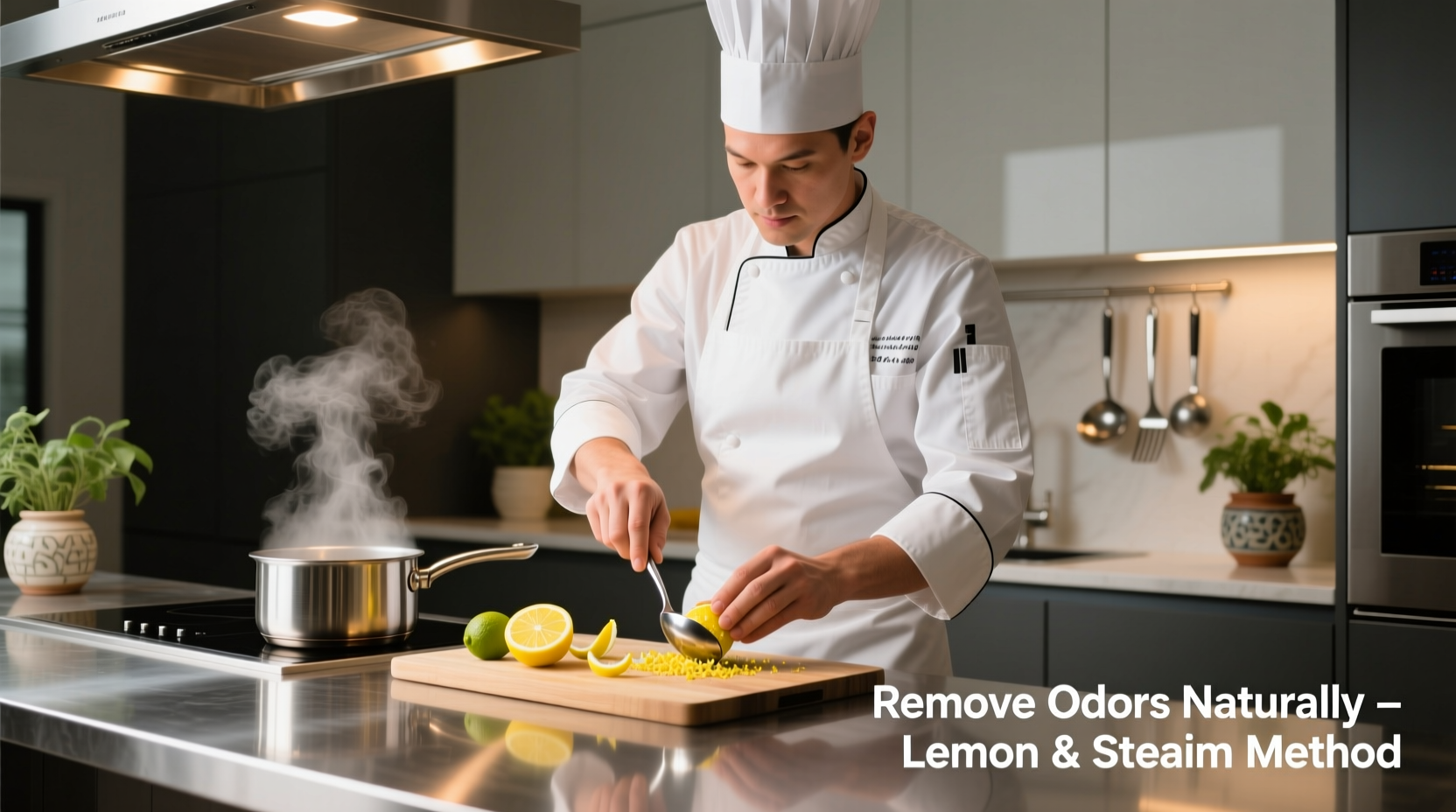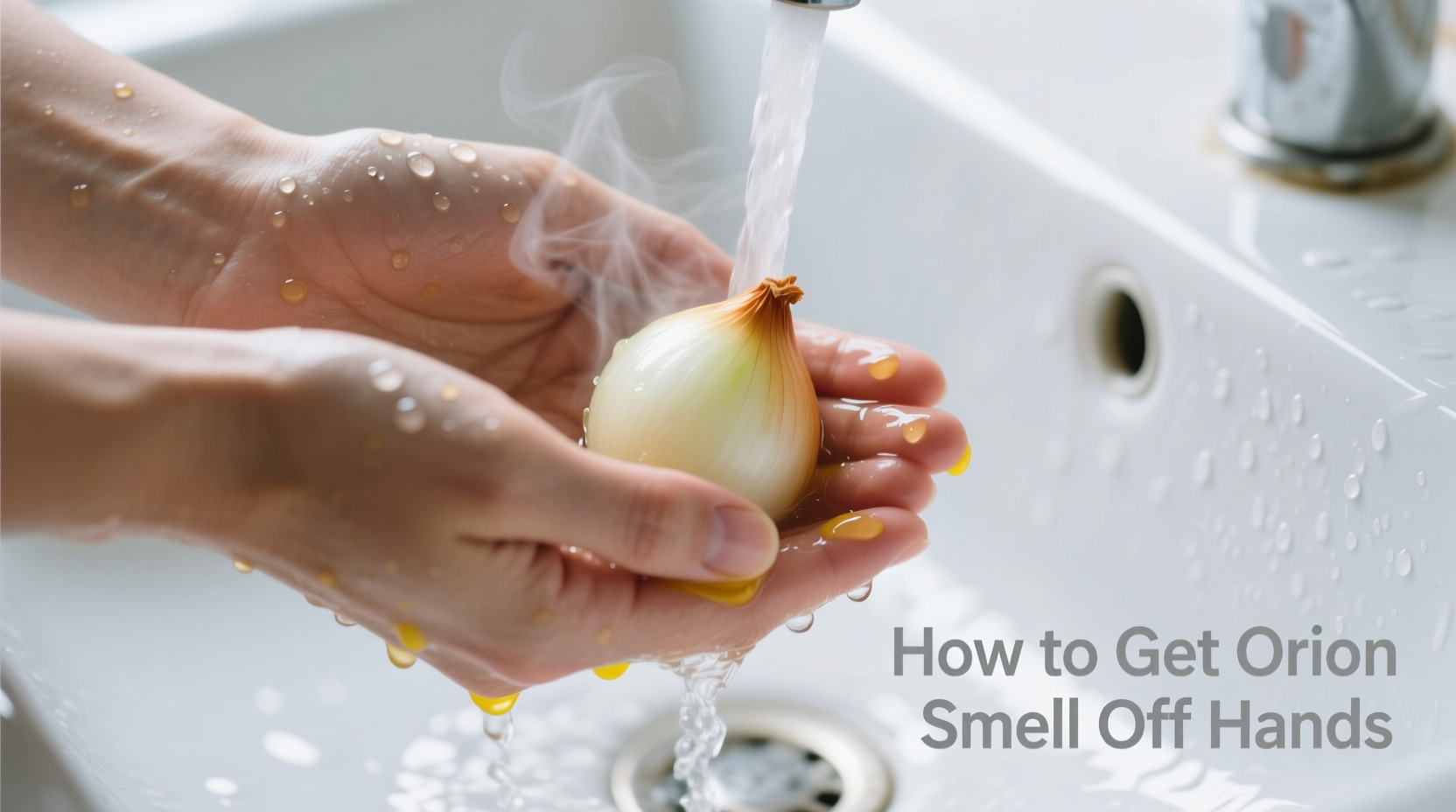Onion smell clinging to your hands after cooking is one of those frustrating kitchen problems that seems to defy regular washing. You've probably scrubbed with soap multiple times only to find that pungent odor stubbornly remains. The good news? There are several highly effective methods backed by food science to eliminate onion smell from hands quickly and completely.
Why Onion Smell Sticks to Your Skin
When you cut onions, you rupture cells containing sulfur compounds like syn-propanethial-S-oxide. These volatile molecules bind to the proteins in your skin, creating that persistent odor that regular soap often fails to remove. As Dr. Harold McGee explains in On Food and Cooking, "the sulfur compounds responsible for onion's aroma are particularly adhesive to skin proteins, making them difficult to wash away with standard cleansers."
| Method | Effectiveness | Time Required | Accessibility |
|---|---|---|---|
| Stainless steel | ★★★★★ | 30 seconds | High (kitchen item) |
| Lemon/vinegar | ★★★★☆ | 1 minute | High (pantry item) |
| Salt scrub | ★★★☆☆ | 2 minutes | Very High |
| Baking soda | ★★★☆☆ | 2 minutes | High |
Most Effective Onion Smell Removal Techniques
1. The Stainless Steel Method (Most Effective)
This isn't kitchen folklore—it's chemistry in action. The sulfur compounds from onions bind to the iron in stainless steel, effectively transferring the odor molecules from your skin to the metal.
How to do it:
- Hold a stainless steel spoon, soap dispenser, or专门 designed odor-removing tool
- Run cold water over your hands
- Rub hands against the steel for 30 seconds
- Rinse thoroughly with cold water
According to research published in the Journal of Agricultural and Food Chemistry, "metal surfaces, particularly those containing iron, effectively neutralize volatile sulfur compounds through adsorption and chemical reaction." This explains why the stainless steel method works so well.
2. Citrus or Vinegar Rinse
The acidity in lemon juice or vinegar helps break down the sulfur compounds causing the odor.
How to do it:
- Squeeze half a lemon into a bowl of water or use 2 tablespoons of white vinegar
- Soak hands for 1-2 minutes
- Wash with soap and cold water
- For stronger odors, rub cut lemon directly on hands first
3. Salt and Soap Scrub
Salt acts as a gentle abrasive that helps remove the oily compounds from your skin.
How to do it:
- Wet hands with cold water
- Sprinkle table salt or coarse sea salt on palms
- Add a small amount of liquid soap
- Rub hands together for 60 seconds, focusing on fingertips and nails
- Rinse thoroughly with cold water
When to Use Which Method
Choose your approach based on your situation:
- Immediate solution while cooking: Keep a stainless steel soap bar by your sink for instant odor removal between chopping onions and handling other ingredients
- After finishing cooking: The salt and soap scrub provides thorough cleaning if you have lingering odor
- No special items available: Rub hands with coffee grounds (the acids help neutralize odors) followed by regular soap
- For sensitive skin: The lemon method is gentler than salt scrubs but avoid if you have cuts
Preventing Onion Smell Before It Starts
Professional chefs use these preventive measures to avoid the problem altogether:
- Wear thin food-safe gloves while chopping onions
- Cool your knife in the freezer for 15 minutes before cutting (reduces enzyme activity)
- Use a sharp knife to minimize cell damage and release fewer sulfur compounds
- Chop onions under running water or near a fan to disperse volatile compounds
Common Mistakes That Make Onion Smell Worse
Avoid these counterproductive approaches:
- Using hot water (opens pores and sets the odor)
- Over-scrubbing with harsh abrasives (irritates skin and spreads oils)
- Using only regular soap without additional methods (often ineffective)
- Touching metal surfaces like faucets before washing (transfers odor)
Remember that prevention is always better than cure. As Antonio Martinez, a culinary instructor at the Culinary Institute of America, notes: "The best approach is to minimize odor transfer from the beginning by using proper knife skills and having your odor-removal method ready before you start cutting onions." 
Why These Methods Work: The Science Explained
The effectiveness of these techniques comes down to food chemistry. Onions contain amino acid sulfoxides that, when cut, convert to sulfenic acids. These quickly rearrange into syn-propanethial-S-oxide, the volatile compound responsible for both tears and the persistent odor.
As explained by the American Chemical Society, "sulfur compounds bind strongly to skin proteins through disulfide bonds, which is why they're so difficult to remove with water alone." The successful removal methods work by either:
- Binding the sulfur compounds to another surface (steel method)
- Breaking the chemical bonds (acidic solutions)
- Physically removing the compounds (abrasive methods)
When Onion Smell Persists: Advanced Solutions
If you've tried multiple methods and still have odor, try this professional chef technique:
- Rub hands with stainless steel under cold water for 30 seconds
- Apply a paste of baking soda and water, scrub for 1 minute
- Rinse, then soak hands in diluted vinegar (1 part vinegar to 3 parts water) for 2 minutes
- Wash with mild soap and cold water
This multi-step approach addresses the odor through different chemical mechanisms for complete removal.
Final Thoughts
Removing onion smell from hands doesn't require special products—just understanding the chemistry behind the odor. The stainless steel method remains the quickest and most effective solution for most home cooks, while the citrus and salt methods provide excellent alternatives when steel isn't available. By implementing these techniques, you can enjoy cooking with onions without the lingering reminder on your hands.











 浙公网安备
33010002000092号
浙公网安备
33010002000092号 浙B2-20120091-4
浙B2-20120091-4